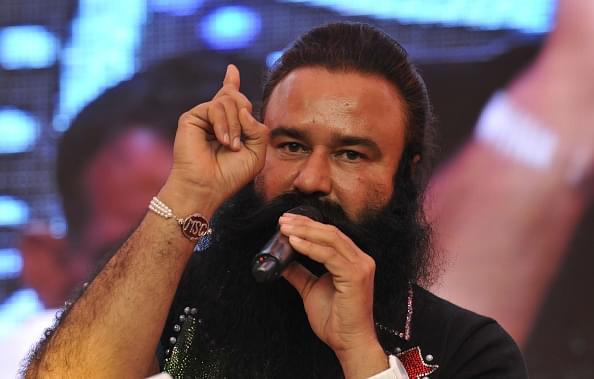Politics
How Do We Prevent Our Politicians From Bowing Before Babas Like Ram Rahim?
Dr A.K Verma
Aug 30, 2017, 03:05 PM | Updated 03:05 PM IST
Save & read from anywhere!
Bookmark stories for easy access on any device or the Swarajya app.


The answer to that reveals a lot about both Indian society, and politics.
‘We the people of India’ are in a state of shock at the vulgar turn of events at Sirsa and other areas in Panchkula in Haryana. It is not surprising that the ‘faithfuls’ of Dera chief Gurmeet Ram Rahim Singh turned violent after he was pronounced guilty by the CBI court because they were completely intoxicated by the rapist baba’s charismatic aura, but it was certainly bewildering to see a huge contingent of women leading the arson gang. What, however, painfully surprised us is the fact that the entire state of Haryana and all organs of government were at the ‘beck and call’ of the baba.
How that could be? Isn’t it bewildering that the rape case took 15 long years in the CBI court? During this time, Gurmeet Ram Rahim Singh consolidated his position in the system, allegedly exterminating, threatening or purchasing anyone who happened mattered except of course the courageous special Judge Jagdeep Singh, who found him guilty, and the two witnesses who orally recorded evidence in the CBI court against the rapist baba.
The Punjab and Haryana High Court had to take a suo motu cognisance of the letter of one sadhvi written anonymously to the then prime minister Atal Behari Vajpayee in 2002 and ordered the CBI to file a case against Ram Rahim. However, his financial and political clout grew phenomenally during the 15 years hence, and successive Congress governments at the centre (2004-2014) and Bhupender Singh Hooda’s government in Haryana (2005-2014) did nothing to stop this don-kind baba. Politicians of all hues kept making a beeline for his darshan and blessings just for a few votes. The Congress managed his support in 2009 and won 40 seats; in the 2014 assembly polls, the rapist baba blessed the Bharatiya Janata Party (BJP), which was catapulted from four to 47 seats and formed the government in Haryana. What a shame! Have politicians converted our democracy in to electocracy? Is winning election all that matters to them, unmindful of the cost involved?
Why do people get attracted to babas? The answer may have a bearing on the non-functioning, corrupt, administrative system and the unresponsive and insensitive political dispensation, which is bothered only about safeguarding its own position and winning the next election. The ordinary men and women then look up to influential people like these babas who demonstrate great clout with anyone who happens to be in power. Many followers see clearly that top politicians and bureaucrats regularly visit the charismatic baba and, hence, their faith in such people gets reinforced. They forget about the Constitution and law and the multifarious political institutions and prefer the comforting cover of the baba in spite of the exploitation they are subjected to.
The German sociologist, Max Weber, talked about three kinds of authority patterns: the charismatic, traditional and the legal-rational. The charismatic authority is built around the aura of a charismatic person, traditional around a feudal lord and the legal-rational around the Constitution. Obviously, when the constitutional authority does not function or assert, the remaining authority patterns will rise and assert. That is exactly what has happened in this case of Dera Sacha Sauda of Gurmeet Ram Rahim Singh in Haryana.
The honourable Supreme Court might have put an end to the practice of triple talaq nature among the Muslim community, but who would effect a talaq among the triplets of Weberian authority patterns in India and force ‘we the people’ to get wedded to only the legal-rational authority i.e. the Constitution and law of the land? Seventy years is not a short period for a nation to learn the ethics of a constitutional democracy. So, how to fight the rot that has overtaken us and forced us to turn our back to the Constitution and law and get luridly attracted to the non-democratic, unconstitutional feudal and charismatic authorities in the society?
Two very prominent issues need to be discussed. One, how to rejuvenate peoples’ faith in the Constitution, law and democracy so that they can be retrieved from the clutches of these babas claiming to be their saviours?
Two, while most of the babas are surely crorepatis, our concern is not so much their wealth as their influence in the political system and electoral process due to their vast following. How to deal with that?
The first issue requires a robust toning up of the entire political and administrative system that can address day-to-day problems of poor, marginalised and ordinary people. These people form a major of these babas’ followers, and most of them resort to this due to their disenchantment with government agencies in ameliorating their problems. That speaks a lot about the poor preference given by successive governments to governance and welfare of people. Parties, governments and leaders must seriously ponder over the fact that without serious intervention in governance and dealing with peoples’ problems first, their days might be numbered. They must not surrender to babas and must attempt to form their own popular base. Why they should reach the people via babas? If they had to compete with babas, then our democracy will also have to compete with feudalism: since Independence, we are already struggling with the incongruity of running our democratic system of a largely feudal society.
What can be done to stop babas from interfering in the democratic process and policy making? For that, we need to revisit our political culture where attitudes, beliefs and values of our political functioning need to be redefined. All parties should engage in politics in a professional manner and provide regular training to leaders and workers to set right their political and social orientations in consonance with democratic polity.
If violence is spreading in a traditionally non-violent society and if followers of god men and babas are taking law into their own hands, it’s time to sit up, diagnose and take remedial measures to address the deeper malaise creeping into our democratic polity.
A K Verma is Director, Centre for the Study of Society and Politics, Kanpur.





